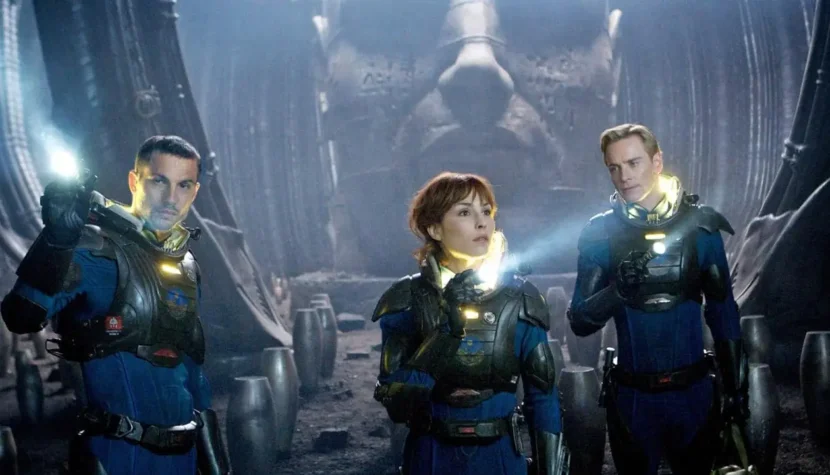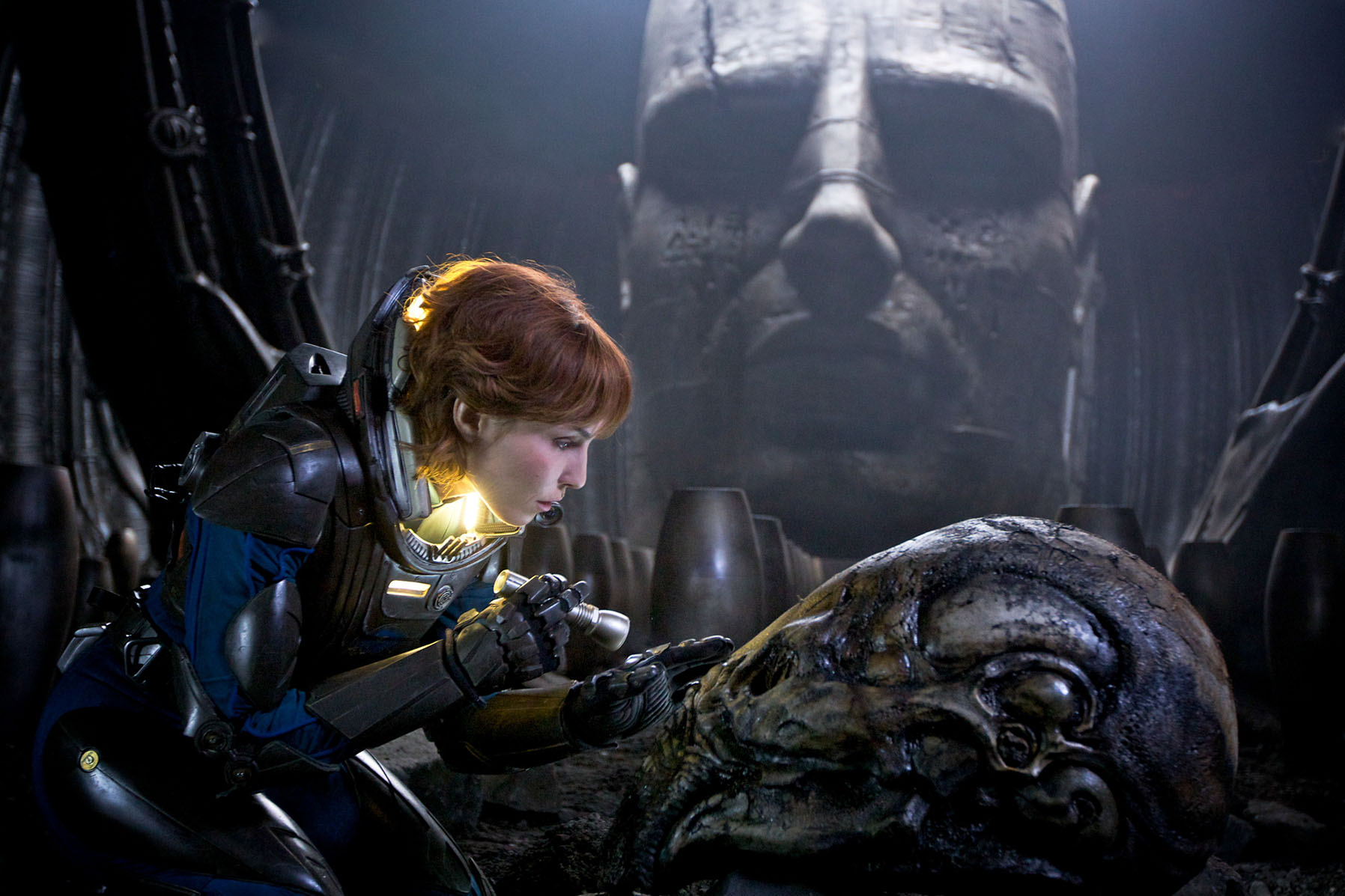PROMETHEUS. Ridley Scott’s dissapointing sci-fi

“They say that frustration holds a rightful place among the strongest motivators for action. I am interested in its study because, in my understanding, the bitterness born from the inability to comprehend and accept certain monstrous things is the leading theme of Ridley Scott‘s film Prometheus. The more cynical might add, with a fair degree of likelihood, that a related set of unpleasant emotions may also accompany disappointed fans after leaving the cinema.
In the prelude to *Prometheus*, the British director expresses a Kubrickian sensibility, only to briefly pause on the Isle of Skye before shifting the action into the infinite darkness of space, where we are introduced to the android David, who watches over the crew’s cryo-sleep. Those seeking visual stimulation will be more than satisfied from the very first scenes—the scale of the set design and the virtuosity of Wolski, combined with Scott’s meticulousness, produce a truly stunning effect. I would even venture to say that *Prometheus* is a true audiovisual masterpiece, vying for the title of one of the best-made sci-fi films ever—regardless of whether we’re gazing at a majestically drifting ship or traversing the bowels of an alien complex with the crew. It’s worth mentioning that the legendary director uses the benefits of 3D technology with due subtlety and maturity.

Scott has always been one of those creators who meticulously implement the principle that female characters are not merely decorative; on the contrary, from his earliest works, he seems to have a particular fondness for his heroines. *Prometheus* is no exception to this rule, as evidenced by the construction of Elizabeth Shaw’s character. It’s impossible to take your eyes off Noomi Rapace, who plays her. Sensitive, jovial, buoyed by dreams, and irrevocably devoted to God, Dr. Shaw, like Ellen Ripley, only gradually dons the armor of a warrior. After all, as is commonly known, fire tempers what it cannot consume. Shaw, however, will endure a greater hell than her cult-predecessor. Thanks to this role, Rapace will likely gain countless new admirers, although it seems that only the sequels will give her character a chance to replicate her predecessor’s success. Nonetheless, it remains true that the Swedish actress solidifies her status as one of the best working artists today, constantly indifferent to the script’s occasional shortcomings.
However, the film’s brightest point is undoubtedly David himself, ambiguously portrayed and masterfully interpreted by Michael Fassbender. Stripped of a soul and morality, with eyes sparkling with childlike enthusiasm and lips twitching with proud disdain, he sometimes evokes memories of Roy Batty. Perhaps only Meredith Vickers, wearing an icy mask, exhibits more restrained expressions—a traditional delegate of the stiff corporations in this universe, finely executed by Charlize Theron. In smaller, yet vivid roles, a wide spectrum of British actors also shines in the background, among whom viewers will likely remember Sean Harris as the tattoo-covered geologist misfit. Idris Elba also deserves attention, transferring the archetype of the seasoned sea wolf straight into the star-studded galactic depths. Unfortunately, most characters leave the impression of being underutilized and somewhat two-dimensional.

Narratively cohesive, *Prometheus* as promised operates within a maze of ideas concerning the origins of humanity, but unfortunately, the elevated atmosphere is diluted by immature (often comedic) touches. The main problem with the script is the inconsistent and imprudent behavior of the crew members, who trudge through LV-233 like a blissful teenage phalanx, far from the image of professionals on the brink of a monumental discovery. In fact, some deaths are more deserving of the Darwin Award than the best dialogues, just as certain events sometimes come off as unnatural. Additionally, the script is weighed down by missed opportunities and ubiquitous clichés.
It’s difficult for me to guess how the contributions of individual screenwriters ultimately shaped up, though the burden of the psychological depth of the characters is said to rest with Spaihts. However, knowing his previous works, I would primarily suspect the creator of *Lost* of any obstructive influence. Damon Lindelof has already established himself as a charlatan, a third-rate illusionist, and a wandering trickster. After all, how else could you describe someone capable of weaving the illusion of multi-layered interpretations while merely scratching the surface of a frozen lake with a dagger? True to tradition, the television screenwriter raises big questions and shies away from answers. Attentive viewers will undoubtedly catch some clues and piece together the facts, but critical threads will only find resolution in the continuation. The author himself might not even have a clear understanding of some of the murkier concepts.

I approached *Prometheus* as I always do—with an open mind—but it’s hard to forget Scott’s promises. We know what goal he had in mind while producing this film, and unfortunately, it’s difficult to speak of fulfilled ambition here, which also teaches us another lesson in humility when dealing with American studio marketing. Am I suggesting that the film is completely devoid of horror elements? Not at all. The atmosphere occasionally strikes a familiar chord, but overall, little remains of the tension and the sword of Damocles hanging over the characters that were the hallmark of the *Alien* universe. In terms of lineage, *Prometheus* is closer to *Blade Runner* than to *Alien*. This would be a huge advantage, of course, were it not for the aforementioned script shallowness. There is no shortage of action either, but the struggle for survival abandons the form of a hunt or dance in the dark, and this time, the protagonists wield heavier weapons. Not everyone will be charmed by the “smoothed” locations, as some design solutions clearly reveal space opera inspirations.
The music by Marc Streitenfeld, characterized by a Williams-like style, cannot be counted among the film’s flaws. Although in some segments it fits like a square peg in a round hole, overall, it harmonizes nicely with the visuals, and the memorable main theme deserves loud applause.

Regrettably, unlike the previous sci-fi films by the British director, here we have received a barrel of honey mixed with spoonfuls of tar. While it may surpass the average Hollywood blockbuster, I expected more from the intellectual caliber of the creators. *Prometheus* is merely a prologue, a slice of a larger story that doesn’t fare well on its own. I await the continuation while also recommending that Scott be more selective in choosing collaborators. Perhaps it’s worth launching someone in an escape pod and continuing the journey with a slightly different company? It’s a shame to waste the master’s good form, as he has given us a rather decent piece of sci-fi cinema.

